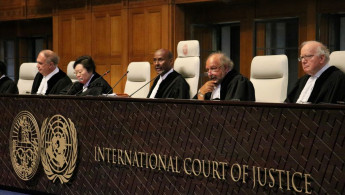International Court of Justice to rule on Iran-US frozen assets claim
Judges at the International Court of Justice (ICJ) in The Hague will on Thursday rule on a claim from Iran that Washington illegally allowed courts to freeze assets of Iranian companies.
The ruling, set for 3 p.m. (1300 GMT), comes amid heightened tensions between the United States and Iran after tit-for-tat strikes between Iran-backed forces and US personnel in Syria last week.
Relations are also strained after attempts to revive a 2015 nuclear deal between Iran and major world powers stalled, and as Iranian drones are being used by Russia against Ukraine.
The case before the ICJ, also known as the World Court, was initially brought by Tehran against Washington in 2016 for allegedly breaching a 1955 friendship treaty by allowing US courts to freeze assets of Iranian companies, including $1.75 billion from Iran's central bank. The money was to be given in compensation to victims of terrorist attacks.
The US has said the whole case should be dismissed because Iran has "unclean hands" and the asset seizures were the result of Tehran's alleged sponsoring of terrorism.
The Islamic Republic denies supporting international terrorism.
The 1950s friendship treaty was signed long before Iran's 1979 Islamic Revolution, which toppled the U.S.-backed shah, and the subsequent severing of U.S.-Iranian relations. Washington finally withdrew from the treaty in 2018.
The rulings of the ICJ, the United Nations' top court, are binding, but it has no means of enforcing them. The United States and Iran are among a handful of countries to have disregarded its decisions in the past.





 Follow the Middle East's top stories in English at The New Arab on Google News
Follow the Middle East's top stories in English at The New Arab on Google News


